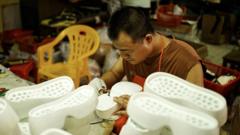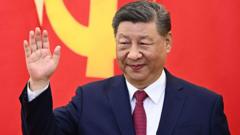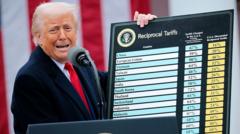Small businesses across China are experiencing a significant downturn as a result of U.S. tariffs on imports. The Canton Fair in Guangzhou showcases the plight of these businesses, with concerns rising over the retention of trade practices. Despite potential avenues for domestic growth, many are left pondering the future as uncertainty looms.
The Toll of Tariffs: Chinese Small Businesses Feel the Pressure from Trump's Trade Policies

The Toll of Tariffs: Chinese Small Businesses Feel the Pressure from Trump's Trade Policies
As the trade war escalates, small businesses in China grapple with the consequences of high tariffs imposed by the U.S. on their goods, revealing a deepening economic struggle.
The ongoing trade war between the United States and China is taking a heavy toll on small businesses in China, which are facing serious operational challenges due to high tariffs imposed by President Trump. One such business, Sorbo Technology, owned by Lionel Xu, has halted the sale of its mosquito repellent kits, formerly a best-seller in Walmart stores in the U.S. Xu expresses deep concern about the future of his company, stating, “This is so hard for us.” Approximately half of Sorbo’s products are sold to U.S. markets, leaving the company in a state of limbo due to the staggering 145% tariffs on Chinese goods headed to the United States.
At the Canton Fair in Guangzhou, the ripple effects of this economic conflict were evident. Vendors like Amy from Guangdong Sailing Trade Company report a complete stop to production, with their products stagnating in warehouses. The trade fair, an event that usually facilitates international business, this year echoed a prevailing sense of uncertainty. Traders from more than 30,000 businesses displayed their wares, but many were apprehensive, unable to make deals as the increased costs deterred American buyers from purchasing goods.
The tariffs imposed by both nations have resulted in a stalemate, where Chinese products destined for American households become increasingly unaffordable. As a result, American consumers may soon feel the brunt of rising prices across their kitchens and living rooms. In response to the tariffs, Chinese officials maintain a firm position, vowing to continue the trade war "until the end." Some businesses at the fair responded optimistically, suggesting they would prioritize their domestic market if necessary and redirect focus toward European and Middle Eastern markets.
Meanwhile, the broader economic landscape in China presents an additional layer of complexity. Despite having a vast domestic market of 1.4 billion, consumption growth remains sluggish as many middle-class consumers choose to save due to falling property prices. The dependence on exports for economic growth is palpable, with Goldman Sachs estimating a significant number of Chinese workers engaged in producing goods destined for the U.S.
Workers in manufacturing hubs are already exhibiting the repercussions of the trade tensions, reporting decreased wages and limited job opportunities. As businesses recalibrate their strategies, some are shifting their focus toward domestic consumers, with companies like Amy's hoping to break into new markets abroad.
The uncertainty surrounding the trade policies, compounded by the unpredictability of Trump's administration, leaves both sides bracing for potential economic fallout. Limited communication between Washington and Beijing further complicates the path towards a resolution. As the dialogue remains stagnant, questions swirl around the future of U.S.-China relations and the sustainability of small businesses caught in the midst of this economic clash.























